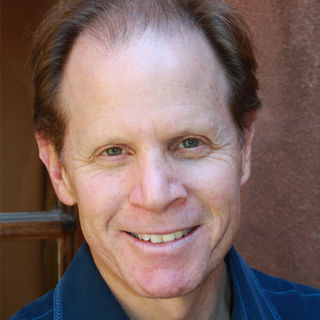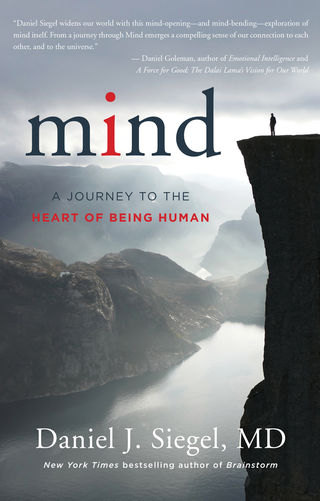Empathy
Mind: A Journey to the Heart of Being Human
The Book Brigade talks to psychiatrist Dan Siegel about the nature of the mind.
Posted September 29, 2016

An important way to improve not only mental health but also physical health is to recognize that the mind is more than the product of the brain: It is also arises from subjective experience and bonds with others.
You’ve published many books. What prompted this one in particular and also its chronologically inflected structure?
Over the past four decades, in my own personal and professional experience, it became apparent that the term “mind” did not have a definition in a wide range of fields, including medicine, psychology, and even philosophy. Since the days of Hippocrates’ statement 2,500 years ago, reaffirmed by William James in 1890, we’ve held onto a notion that “the mind is what brain does” in many academic fields and in our modern society. But subjective experience and consciousness, even if an outcome of the brain, are not simply reducible to neuronal activity, and there may be even more to our mental life, such as it also being a self-organizing property of embodied and relational energy and information flow.
Fields such as mental health, education, and parenting might be hampered by the lack of definition of what the mind actually is. To capture the importance of subjective experience as one central facet of mind and to explore the centrality of our relational origins of mind, it seemed important to invite the reader to experience his or her own inner and interpersonal mental life by offering autobiographical reflections of my own.
You share details of your disaffection with the medical training you received, specifically the idea that you needed to disengage from patients as individuals. How has the medical profession changed with regard to interpersonal doctor/patient relations, and how would you like to see it evolve?
In some medical schools, self-awareness and empathy training are being offered, and this is a wonderful shift in our focus toward the internal and interpersonal reality of the mind in medicine. But sadly for many other programs, students and postgraduate trainees still are not offered education or skills training to strengthen their own minds, reduce burnout, and maintain empathic and compassionate connection with their patients. Despite research revealing that empathy improves the patient’s immune response and mindfulness training maintains empathy and reduces burnout, we still rarely teach these skills, and rates of burnout, anxiety, and depression have dramatically risen in the last few years in our postgraduate training programs. This state of affairs can be helped if medicine were to “see the mind” of both physician and patient as central to how we take part in the healing relationship.
As a medical student (on leave) you coined the term “mindsight,” which encompasses the capacity to cultivate insight, empathy, and integration. How does the focus on subjective experience inform healing in medicine in integration in one’s workaday life?
The subjective life of the mind, though neither measurable nor easily studied in science, is quite real, and really important. We become aware of that subjective flow of life with insight and with empathy. When we honor our distinct subjective lives and then connect them with attuned, empathic communication, we create the linkage of differentiated parts that reveals the process of “integration.” The reason such self-awareness and caring communication may be so important in medicine is that they help the patient become mentally joined with the physician, and this joining optimizes self-organization and creates well-being in how energy and information are flowing in a person’s life. The same integration takes place in our work lives; when we connect with both our own and others’ inner mental seas, the subjective lives of our minds, we create more joining and more well-being.
Can you expand on your interest in a distributed mind or “we-identity”?
Seeing the mind’s self as coming solely from the solo brain in the skull is likely only part of a bigger story of the mind: We have an internal identity as “me” and we have an interconnected mind as a “we.” Research reveals repeatedly that our relationships with others are not only a robust source of mental health and happiness but also a determinant of our medical wellness and longevity. An integrated identity would be combining this me with we as a “MWe.”
What is the most important point you want to get across in Mind?
If we consider the definition of one facet of the mind as a self-organizing, embodied, and relational process that regulates energy and information flow in our lives, then we can see 1) how integration would be the scientifically predicted process beneath optimal living, as linking differentiated parts of a system optimizes self-organization and creates harmonious functioning; and 2) how our minds and the self that emerges from them are created not only in our body and its brain but—equally important—in our relationships with other people and with the planet. This view might help us create more personal, interpersonal, and global well-being in our collective lives.
How did you arrive at the insight that integration is, in your words, “the basis not only of health but also of the world’s wisdom traditions?”
While teaching around the world, individuals from a range of wisdom traditions have approached me and shared how the outcomes of integration I had discussed with them—such as emotional balance, body regulation, insight, and morality—overlapped with what their culture had been teaching for thousands of years. People from the Inuit, Lakota, and Polynesian traditions, as well as from religions such as Hinduism, Christianity, Judaism, and Buddhism were startled by this overlap of integrative findings and wisdom teachings, and so was I!
You define kindness as honoring and supporting others’ vulnerabilities. How do you recommend that people strive to better tap this most human and positive way of being?
Learning to be “present” in life, to be open to things as they are within us and within others, is the portal to integration that creates the inner and interpersonal conditions at the heart of kindness and compassion. There are integrative practices, such as the Wheel of Awareness, that I discuss in the book that people have found to be deep ways of developing more kindness and compassion. The Wheel practice integrates consciousness, creating more presence and opening the mind to being more connected to oneself, other people, and the larger world in which we live.
What would you like to see happen as a result of the publication of Mind?
If the experience of the book’s questions and journey help invite us to have an open dialogue about what the mind truly is, that would be wonderful. In this conversation perhaps we’d come to be empowered by the possible reality that our mind is not merely brain activity but something more, something that is fully embodied, not just enskulled, and something that is also deeply relational. With such a new conversation, perhaps our internal sense of meaning, our interpersonal connections, and our ways of treating our natural world, our common home, Earth, would be with more kindness, compassion, and love. This might be how we could live the insights we collectively drew from inquiring deeply into the nature of our mind.
About THE AUTHOR SPEAKS: Selected authors, in their own words, reveal the story behind the story. Authors are featured thanks to promotional placement by their publishing houses.
To purchase this book, visit:
Mind: A Journey to The Heart of Being Human





